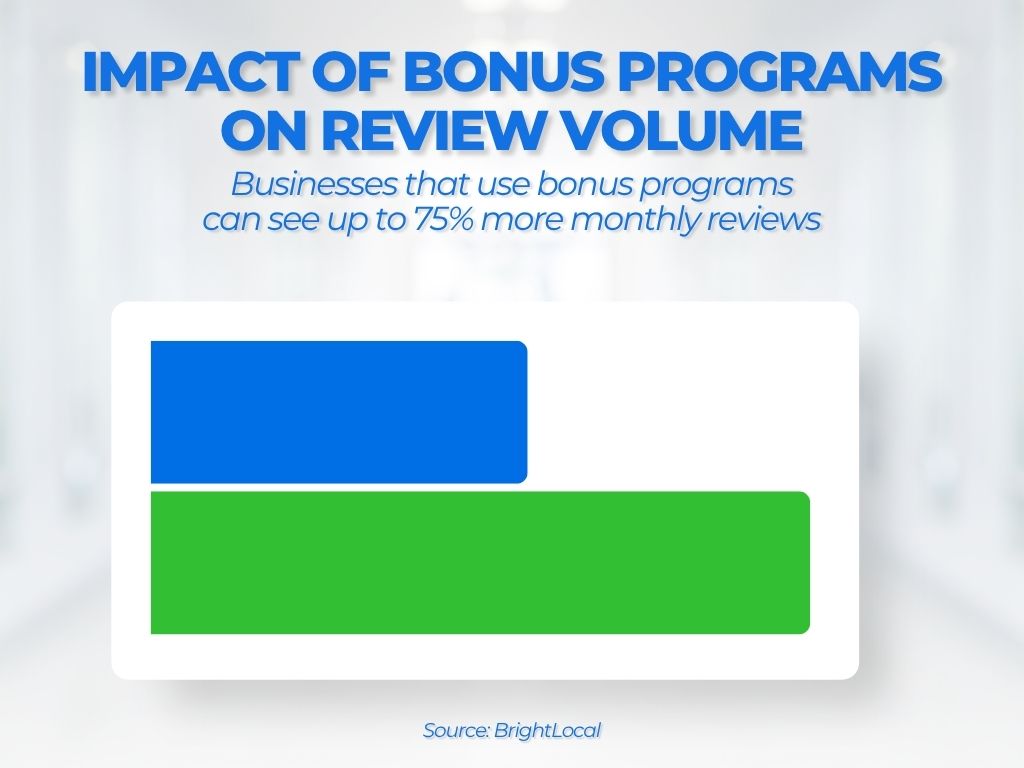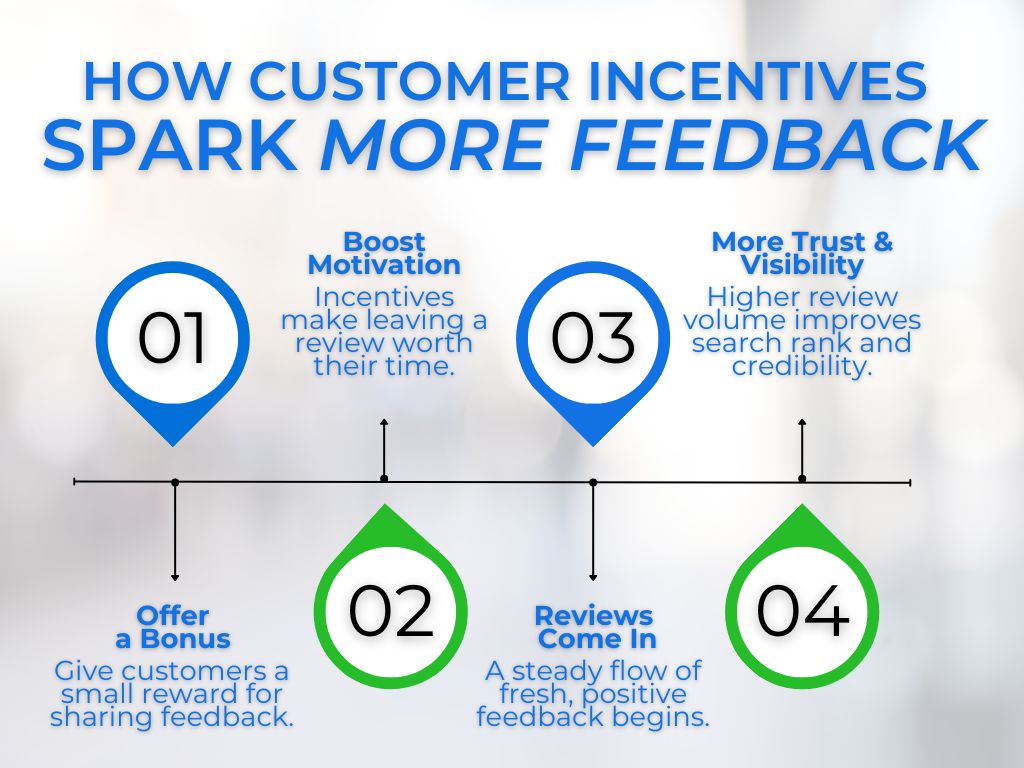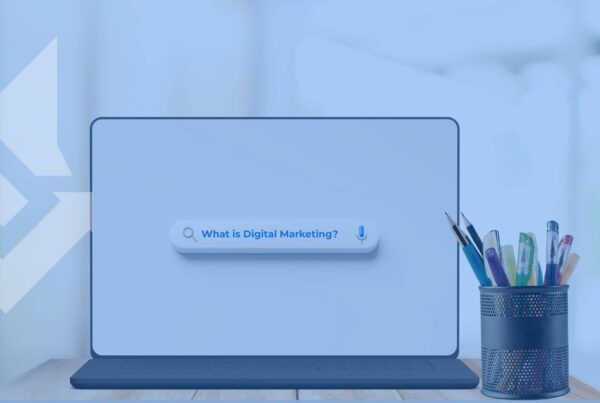Last updated on December 19th, 2025 at 02:46 am
By Amanda Korporaal | Applause Team
In the home services industry, a company’s Google reviews are critical. Before homeowners let a plumber, HVAC, or pest control technician set foot inside, 91% of them check online reviews first.
The vast majority of satisfied customers won’t open Google and leave a review unprompted. And typically, technicians would prefer not to push customers to do so. So how do top-performing brands get hundreds of glowing reviews, while others struggle to hit double digits?
They incentivize their technicians to do so.
Financial incentive programs are the simplest and most reliable way to help inspire reviews by inspiring home service teams to request reviews. One pest control branch used a bonus program to go from just 3 reviews to over 100 in a single month by rewarding techs with cash for every review they generated.
In this guide, we’ll break down how these bonus programs work, why they’re so effective, and how to launch your own.
Contents
Why Google reviews are so critical
Reviews are one of the most powerful revenue levers for your business. 82% of homeowners consider Google reviews essential when selecting a general contractor, and 87% of homeowners won’t even consider a contractor with less than 4 stars.
Below are just a few reasons Google reviews are a necessity for home services companies, big and small.
Breaking into the Google 3-Pack
Google’s algorithm favors businesses with frequent, positive reviews. In fact, review signals account for 17% of local search ranking factors, including placement in the coveted 3-Pack.
The Google 3-Pack is the trio of local business listings that appear prominently on the first page of Google Search results, usually underneath a map, when users search for a service.
These listings are pulled from Google Business Profiles and include details such as the business name, average star rating, number of reviews, business hours, and sometimes photos or quick action buttons like ‘Call’ or ‘Directions.’
Getting into the 3-Pack is critical for local service businesses because it increases visibility, click-through rates, and lead volume by a wide margin (especially on mobile).
Google’s algorithm prioritizes businesses with strong relevance, proximity, and prominence, the latter of which is heavily influenced by the volume and quality of reviews.
For service pros, consistently earning 5-star reviews not only builds trust but also increases the chances of being featured in this high-converting section.

Trust and Credibility
Of course, home services are personal: ultimately, customers have to trust you in their homes. This level of access demands a high degree of confidence in your professionalism, reliability, and reputation.
Just one poor average rating can decimate your pipeline of leads.
In an industry where word-of-mouth and first impressions carry enormous weight, maintaining a spotless reputation can make the difference between a busy season and a rough quarter.
Conversions and Sales
Positive reviews act as social proof. They boost conversion rates by up to 37% once you reach 100+ reviews.
Meanwhile, just one negative review is enough to push 94% of people away.
Customer Expectations
Homeowners are conditioned to read reviews before buying, whether it’s a $20 product or a $5,000 HVAC system.
They expect modern service companies to have fresh, frequent feedback that proves you’re active, responsive, and trusted.
Why Technicians Aren’t Asking for Reviews
It’s not that customers won’t leave reviews. Most will, if you ask. But most businesses don’t, because their techs don’t ask. Below are a few reasons why.
Out of Sight, Out of Mind
Technicians are rushing from job to job. Reviews aren’t on their radar unless someone reminds them, and most businesses don’t have a consistent, automated process for doing that.
It Feels Awkward
Like anyone, most techs feel uncomfortable asking for praise. Without encouragement, training, or rewards, the conversation just doesn’t happen.
No Personal Stake
When there’s no bonus tied to reviews, techs focus on what they’re measured on rather than what you hope they’ll do. That’s why most reviews never happen.
Financial Incentive Bonus Programs: A Game-Changer
While there are a number of reasons techs don’t organically inspire reviews from customers, none of these reasons pose real barriers. A nominal financial incentive is enough for the vast majority of techs to push past any discomfort and ask for a review.
How Bonus Programs Work
There are several proven structures:
- Per-Review Bonuses: $1-$10 for each 5-star review tied to a specific technician.
- Tiered Goals: Bonuses get bigger when techs hit monthly milestones (e.g., $100 for 10 reviews).
- Leaderboards & Competitions: Friendly contests to see who can get the most reviews.
- Tip-Based Messaging: Telling customers, “Your review earns your tech a tip!” makes them more likely to write one.
The Results
Some employees earn $200–$300/month in extra income just from review bonuses.
Synergy Pest Control used bonus programs to add 249 new 5-star reviews in 10 weeks. Another franchise jumped from 3 reviews to 100+ in a month. And in every case, the Google rating soared, along with customer calls.

Why It Works: The Psychology of Incentives
Fundamentally, bonus programs inspire reviews by changing behavior. While behavior change is notoriously difficult, money is the ultimate motivator.
When technicians receive bonuses for review generation, their behavior changes. Instead of sporadically asking for reviews, they begin to ask consistently.
Researchers have known for decades that financial incentive programs tied to specific actions (like customer interactions) can increase performance by anywhere from 20-44%.
When great service leads to great reviews (and great reviews lead to bonuses), it creates a self-reinforcing positive feedback loop. Technicians become more engaged, and higher morale leads to better service, which restarts the cycle.
Gallup research shows that employees who receive recognition and rewards for high performance are 4x more likely to be engaged at work. Better still, engaged employees produce 23% higher profitability.
Best Practices for Review Bonus Programs
To make your program sustainable and effective:
- Make reviews trackable: Use CRMs or review tools that can attribute each review to the right technician. Platforms like Applause make this automatic.
- Be transparent: Clearly explain the rules. What counts? How much will they earn? When do bonuses get paid? Fairness builds buy-in.
- Focus on quality: Only reward 5-star reviews tied to great service. Never encourage fake or pressured feedback; it’s unethical and against Google’s rules.
- Celebrate success: Publicly recognize techs who hit milestones. Share review highlights. Make it part of your team culture.
Conclusion: Reward What You Want to Repeat
At the end of the day, you get more of what you reward.
If you want more 5-star Google reviews to attract more customers, increase bookings, and boost revenue, pay your people to earn them. Not only will you inspire more reviews, but you’ll build a culture of excellence, engagement, and accountability in the process.
Start small: offer $5 for each 5-star review next month. Celebrate the tech who earns the most.
In home services, your Google rating is your brand. And your team is your best marketing channel.






